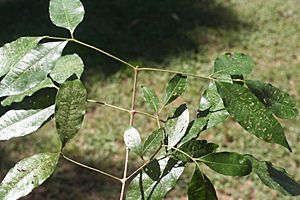Bouchardatia facts for kids
Quick facts for kids Bouchardatia |
|
|---|---|
 |
|
| Bouchardatia neurococca near Mount Mellum | |
| Scientific classification |
|
| Kingdom: | Plantae |
| Clade: | Tracheophytes |
| Clade: | Angiosperms |
| Clade: | Eudicots |
| Clade: | Rosids |
| Order: | Sapindales |
| Family: | Rutaceae |
| Genus: | Bouchardatia Baill. |
| Species | |
|
See text. |
|
Bouchardatia is a small group of two tree species. They belong to the Rutaceae family, which also includes citrus fruits like oranges and lemons. One species is found only in eastern Australia, and the other is found only in New Guinea.
These trees have special leaves made up of three or five smaller parts, called leaflets. These leaves grow in pairs opposite each other on the stem. The flowers of Bouchardatia are bisexual, meaning each flower has both male and female parts. They grow in clusters called panicles. Each flower has four sepals (small leaf-like parts), four petals, and eight stamens (the parts that make pollen). All these parts are separate from each other. The fruit is made of up to four ridged sections, joined at the bottom. Each section holds a single shiny seed.
Contents
What Bouchardatia Looks Like
Bouchardatia plants are usually small trees or shrubs. Their leaves are made of three or five leaflets, but sometimes they can have two or even just one leaflet. The leaves grow in opposite pairs along the branches.
The flowers have four sepals that are joined at their base. They also have four petals that are separate from each other but overlap. There are eight stamens, which are different lengths. The fruit has up to four ridged sections, joined at the bottom. The outside of the fruit is woody. Each section contains one shiny brown seed.
Naming and Classifying Bouchardatia
The group of plants called Bouchardatia was first officially described in 1867. This was done by a scientist named Henri Ernest Baillon in a science journal called Adansonia. The first species discovered was B. australis. However, scientists now consider this to be the same as B. neurococca. When two names refer to the same plant, one is called a synonym.
Species of Bouchardatia
Today, two species are recognized by scientists. They are listed by the "Plants of the World Online" database:
- Bouchardatia cyanosperma Ridl. This species is found only in New Guinea.
- Bouchardatia neurococca (F.Muell.) Baill. This species is found only in eastern Australia.
Where Bouchardatia Grows
Bouchardatia neurococca grows in rainforests, especially dry rainforests. It can be found from areas near the sea up to about 630 meters (2,067 feet) high. Its range stretches from Mackay in central-eastern Queensland down to the Richmond River in north-eastern New South Wales, Australia. The other species, Bouchardatia cyanosperma, grows in New Guinea.
How Bouchardatia Interacts with Nature
The leaves of Bouchardatia plants have tiny pockets called domatia. These small pockets are home to tiny creatures called oribatid mites.
See also
 In Spanish: Bouchardatia para niños
In Spanish: Bouchardatia para niños
 | Jessica Watkins |
 | Robert Henry Lawrence Jr. |
 | Mae Jemison |
 | Sian Proctor |
 | Guion Bluford |

